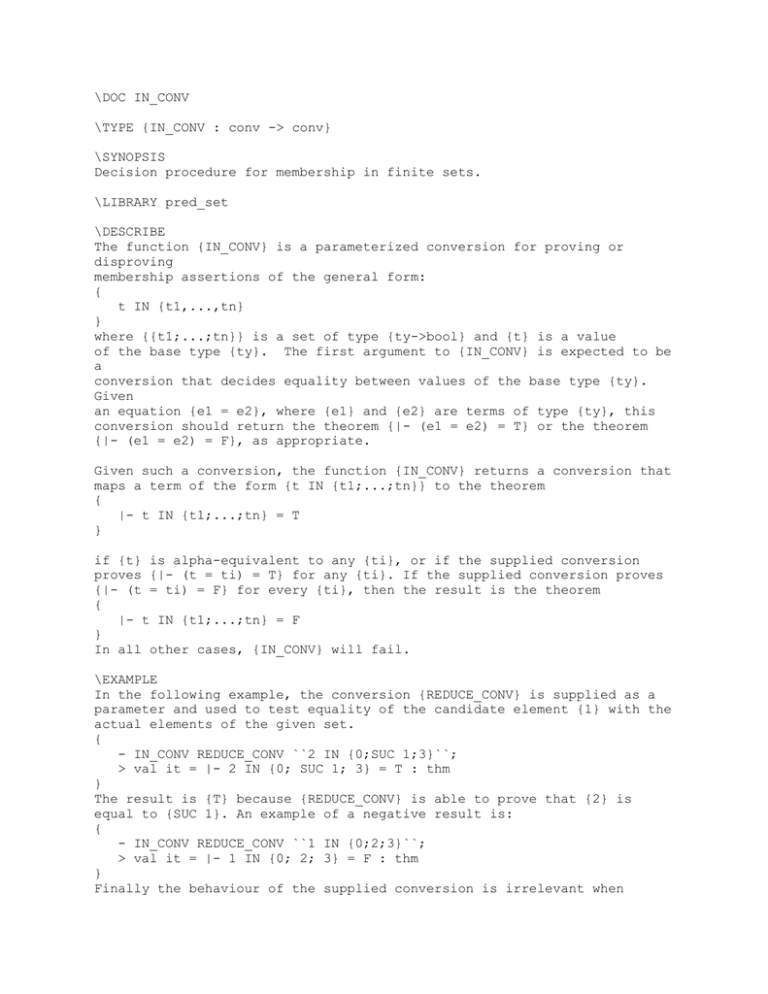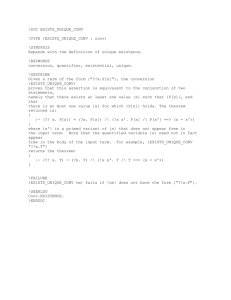\DOC IN_CONV \TYPE {IN_CONV : conv -> conv} \SYNOPSIS
advertisement

\DOC IN_CONV
\TYPE {IN_CONV : conv -> conv}
\SYNOPSIS
Decision procedure for membership in finite sets.
\LIBRARY pred_set
\DESCRIBE
The function {IN_CONV} is a parameterized conversion for proving or
disproving
membership assertions of the general form:
{
t IN {t1,...,tn}
}
where {{t1;...;tn}} is a set of type {ty->bool} and {t} is a value
of the base type {ty}. The first argument to {IN_CONV} is expected to be
a
conversion that decides equality between values of the base type {ty}.
Given
an equation {e1 = e2}, where {e1} and {e2} are terms of type {ty}, this
conversion should return the theorem {|- (e1 = e2) = T} or the theorem
{|- (e1 = e2) = F}, as appropriate.
Given such a conversion, the function {IN_CONV} returns a conversion that
maps a term of the form {t IN {t1;...;tn}} to the theorem
{
|- t IN {t1;...;tn} = T
}
if {t} is alpha-equivalent to any {ti}, or if the supplied conversion
proves {|- (t = ti) = T} for any {ti}. If the supplied conversion proves
{|- (t = ti) = F} for every {ti}, then the result is the theorem
{
|- t IN {t1;...;tn} = F
}
In all other cases, {IN_CONV} will fail.
\EXAMPLE
In the following example, the conversion {REDUCE_CONV} is supplied as a
parameter and used to test equality of the candidate element {1} with the
actual elements of the given set.
{
- IN_CONV REDUCE_CONV ``2 IN {0;SUC 1;3}``;
> val it = |- 2 IN {0; SUC 1; 3} = T : thm
}
The result is {T} because {REDUCE_CONV} is able to prove that {2} is
equal to {SUC 1}. An example of a negative result is:
{
- IN_CONV REDUCE_CONV ``1 IN {0;2;3}``;
> val it = |- 1 IN {0; 2; 3} = F : thm
}
Finally the behaviour of the supplied conversion is irrelevant when
the value to be tested for membership is alpha-equivalent to an actual
element:
{
- IN_CONV NO_CONV ``1 IN {3;2;1}``;
> val it = |- 1 IN {3; 2; 1} = T : thm
}
The conversion {NO_CONV} always fails, but {IN_CONV} is nontheless
able in this case to prove the required result.
\FAILURE
{IN_CONV conv} fails if applied to a term that is not of the form
{t IN {t1;...;tn}}. A call {IN_CONV conv t IN {t1;...;tn}} fails
unless the term {t} is alpha-equivalent to some {ti}, or {conv ``t =
ti``}
returns {|- (t = ti) = T} for some {ti}, or {conv ``t = ti``} returns
{|- (t = ti) = F} for every {ti}.
\SEEALSO
numLib.REDUCE_CONV.
\ENDDOC

